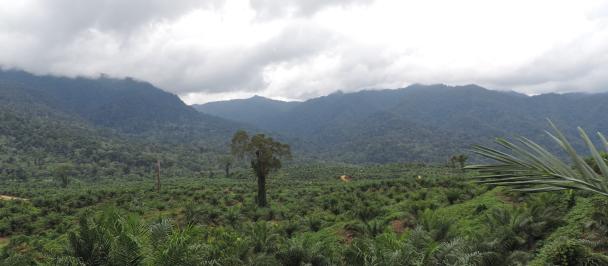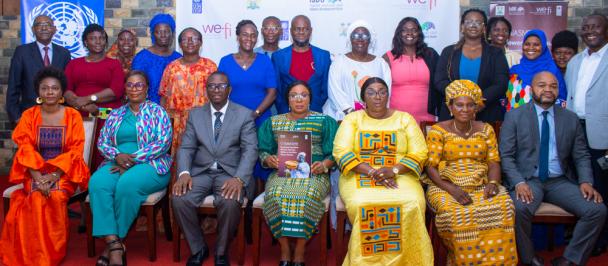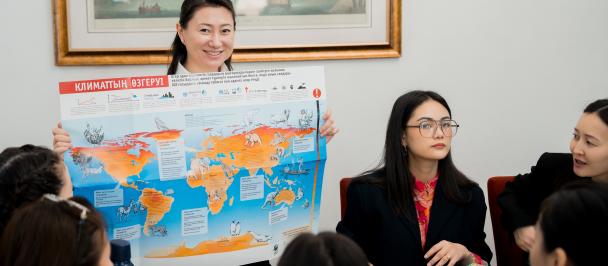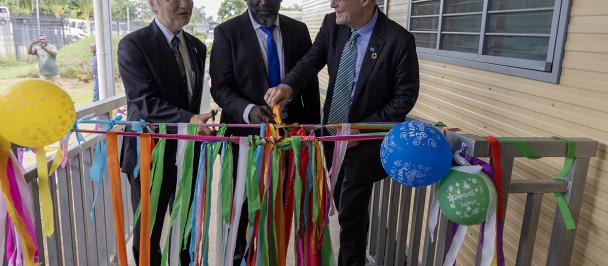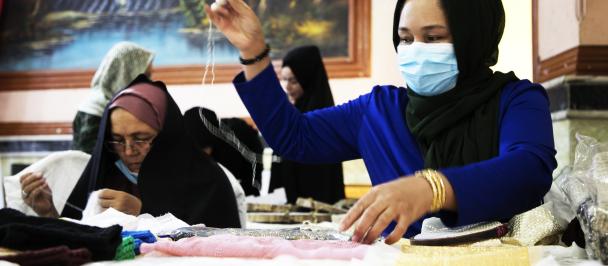Learning by Listening; Children in Indonesia’s mining village mark World Environment Day through tales of mercury risks
June 7, 2022
Award-winning storyteller, Awam Prakoso invites students to cease the use of mercury in Hulawa, North Gorontalo; celebrating World Environment Day
Gorontalo, 7 June 2022 – Hundreds of Indonesian students from the "golden village" of Hulawa, North Gorontalo, its nicknamed earned for being the hub of gold mining, today gathered to hear stories from an award-winning storyteller, Awam Prakoso, on the dangers of mercury, as part of this week’s World Environment Day celebration.
The event was hosted by the United Nations Development Programme (UNDP)’s Gold Opportunities for Long Term Development (GOLD-ISMIA) project. The five-year project is funded by the Global Environment Facilities, and part of the global planet GOLD programme's goal, led by UNDP. The project aims to eliminate the use of mercury in small-scale artisanal gold miners at 6 locations in Indonesia.
The GOLD-ISMIA project has been reaching out to educators in North Gorontalo to develop innovative solutions, as part of their advocacy. At least 644 primary students from 12 schools, accompanied by their teachers, and principals showed up the event. The Regent of North Gorontalo, Thariq Modanggu, and the Head of Education Department, North Gorontalo, Irwan Abudi Usman, M.Pd, also attended as the event, expressing their solidarity to end the use of mercury.
Hulawa village is home to valuable gems. For decades, residents have engaged as artisanal and small-scale gold miners (ASGM), which uses mercury as a part of the gold extraction process. Mercury has negative impacts on human health. Women working in the industry have reported long-term health concerns, which have been transmitted to their children through breast milk. Babies exposed to mercury at a young age often experience developmental delays and reduced cognitive function.
"Delivering the message for young students is essential. As many of them will grow up to become miners – following their family's footsteps or due to various social and economic circumstances. On this World Environment Day, we believe that the event can influence young children to grow up as an agent of change in their hometowns, preventing the usage of mercury and the destruction of our environment once and for all." Baiq Dewi Krisnayanti, National Project Manager, GOLD-ISMIA said.
"Hopefully the "Mercury Hazard Campaign" through tales can benefit our students and be a turning point for gold mining that no longer uses mercury, to be more profitable and safer for the community and the environment in North Gorontalo Regency. Let's take care of the environment around us, if not us, who else?" Thariq Modanggu, Regent of North Gorontalo said.
The children, many of whose parents work in the nearby gold mines, said they loved the story-telling session because it provided them with new information in an entertaining way.
"My hobby is to tell stories." Siti, an elementary student from SDN 9 Sumalata Timur said. "Now I can tell my friends stories about 'air raksa' (mercury) flowing in the river and how I can make my village beautiful."
Artisanal and small-scale gold mines are among the most significant mercury emitters nationwide. The latest Conference of Parties (COP-4) to the Minamata Convention on Mecury, in 2021 noted that over 10,45 tons of mercury were produced by artisanal and small-scale gold miners alone. Policymakers and environmentalists have urged action on addressing the issue UNDP, through the GOLD-ISMIA project , has been actively engaging with delivering solutions to combat mercury use in Hulawa, such as the invention of new sustainable technology for miners; as it works to ensure to leave no one behind, to eliminate the use of mercury.
***
MEDIA CONTACTS
UNDP Indonesia GOLD ISMIA National Project Manager, Baiq Dewi Krisnayanti, baiq.krisnayanti@undp.org
UNDP Indonesia Communications Specialist, Tomi Soetjipto, suryo.tomi@undp.org
UNDP Indonesia Communications Consultant, Eva Pastora, winda.pastora@undp.org

 Locations
Locations